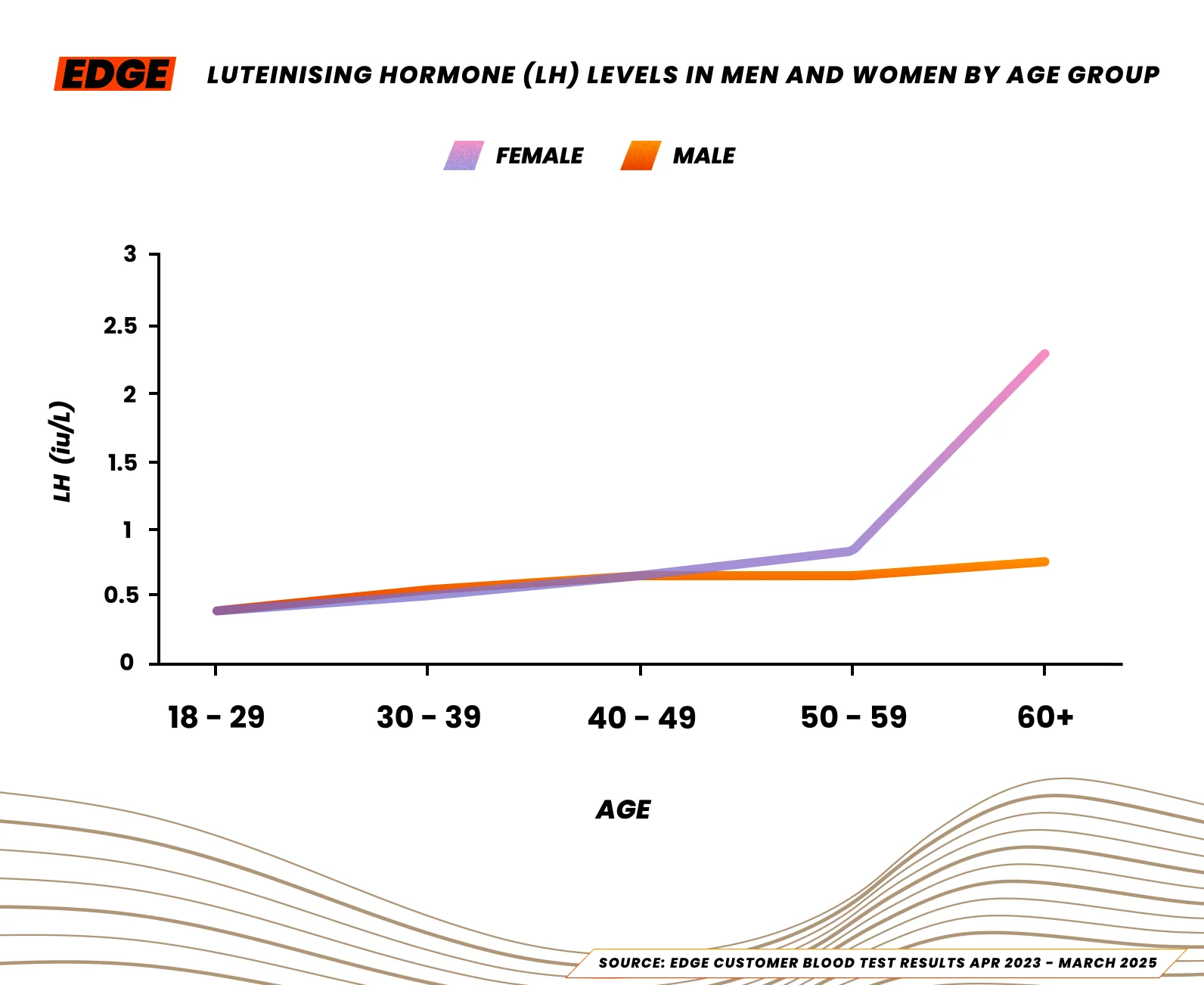What is Luteinising hormone (LH) & why is it important for athletes?
1 min read
Published on
May 22, 2025
Written by
EDGE
Share this article
What Is Luteinising hormone (LH)?
Luteinising hormone (LH) plays a central role in reproductive health and hormonal balance. In women, LH regulates ovulation; in men, it stimulates testosterone production. For athletes, LH is a powerful indicator of how well the body is coping with training demands, nutrition, and stress.
Disrupted LH levels are often linked to energy deficiency, overtraining, or hormonal imbalance, impacting performance, recovery, and long-term health.

"LH plays a key role in regulating sex hormones and can be disrupted by intense training, low energy availability or hormonal imbalance. For female athletes, irregular cycles or low LH may indicate RED-S or the onset of menstrual dysfunction. I recommend testing LH alongside FSH, oestradiol, and progesterone, especially if you’re experiencing menstrual irregularities or reduced performance. Repeat testing across the cycle may provide more detailed insights."
LH in Female Athletes
-
Cycle Regularity & Ovulation
LH surges mid-cycle to trigger ovulation. Irregular or low LH can indicate cycle disruption, often caused by low energy availability or high training loads.
-
Early Indicator of RED-S
Low LH is one of the first hormonal markers to shift when the body lacks fuel. It’s strongly associated with menstrual disturbances, poor bone health, and reduced recovery (RED-S).
-
Fertility Insight
LH is crucial for reproductive planning. Women trying to conceive or coming off hormonal contraception should test LH to assess cycle health.
LH in Male Athletes
-
Testosterone Regulation
LH stimulates testosterone production in the testes. Low LH typically results in low testosterone, which affects strength, libido, and recovery.
-
Overtraining & Hormonal Suppression
Endurance athletes or those with consistently high training volume may experience reduced LH, often alongside other signs of overtraining or RED-S.
-
Supplement and Steroid Use
LH can be suppressed by anabolic steroids or testosterone therapy. Monitoring LH helps assess endocrine system function post-cycle or during recovery.
What are normal Luteinising hormone (LH) levels for athletes?
We looked at blood test data from EDGE customers and found the median Luteinising hormone (LH) levels for women are 7.7 iu/L and 4.9 iu/L for men.
Luteinising hormone (LH) levels vary across the menstrual cycle. LH remains low during the follicular phase, surges sharply to trigger ovulation, then drops in the luteal phase. For athletes, a lack of this natural variation can signal disrupted hormone function, often linked to low energy availability or overtraining. Timing of testing is important when interpreting LH levels.
Here is a breakdown of Luteinising hormone (LH) levels by age:
| Table 1: Luteinising Hormone (LH) Levels in Men and Women by Age Group (iu/L) | ||
| Age Group | Female | Male |
| 18-29 | 0.4 | 0.4 |
| 30-39 | 0.5 | 0.55 |
| 40-49 | 0.6 | 0.6 |
| 50-59 | 0.8 | 0.6 |
| 60+ | 2.3 | 0.75 |
Source: EDGE customer blood test results Apr 2023 – March 2025.
The labs we used to analyse blood samples state a healthy range for Luteinising hormone (LH) is between 2.4 – 12.6 ui/L for women and 1.7 – 8.6 iu/L for men.

Symptoms of Hormonal Imbalance Related to LH
-
Irregular or absent periods (females)
-
Low libido or erectile dysfunction (males)
-
Fatigue, poor strength gains, or frequent illness
-
Stress fractures or low bone density
-
Mood swings or depressive symptoms
Why Test LH?
-
To investigate cycle irregularities or missing periods
-
As part of a RED-S or overtraining assessment
-
To understand testosterone suppression or fertility issues
-
In recovery from disordered eating or long-term under-fuelling
-
Alongside FSH and oestradiol/testosterone for hormonal profiling
How to Optimise Hormonal Balance and LH Levels
-
Eat enough to fuel both training and baseline metabolism
-
Maintain a healthy balance between training intensity and recovery
-
Get 7–9 hours of quality sleep each night
-
Reduce psychological stress through mindfulness or breathwork
-
Avoid excessive weight loss or very low body fat levels
In Summary
-
LH regulates ovulation in women and testosterone in men
-
Low LH is often an early warning sign of RED-S, overtraining, or energy deficiency
-
Testing helps athletes protect hormonal and reproductive health
-
Essential for performance, bone strength, and long-term wellbeing
Check Your LH Levels
Check and monitor your LH levels from home with our sports blood tests.
Get 10% off your first order
Want regular tips on how to make the most of your results? Join our newsletter and we'll give you 10% off your order!
Get the knowledge
Get expert advice to help you improve your results.
Go to our knowledge center


